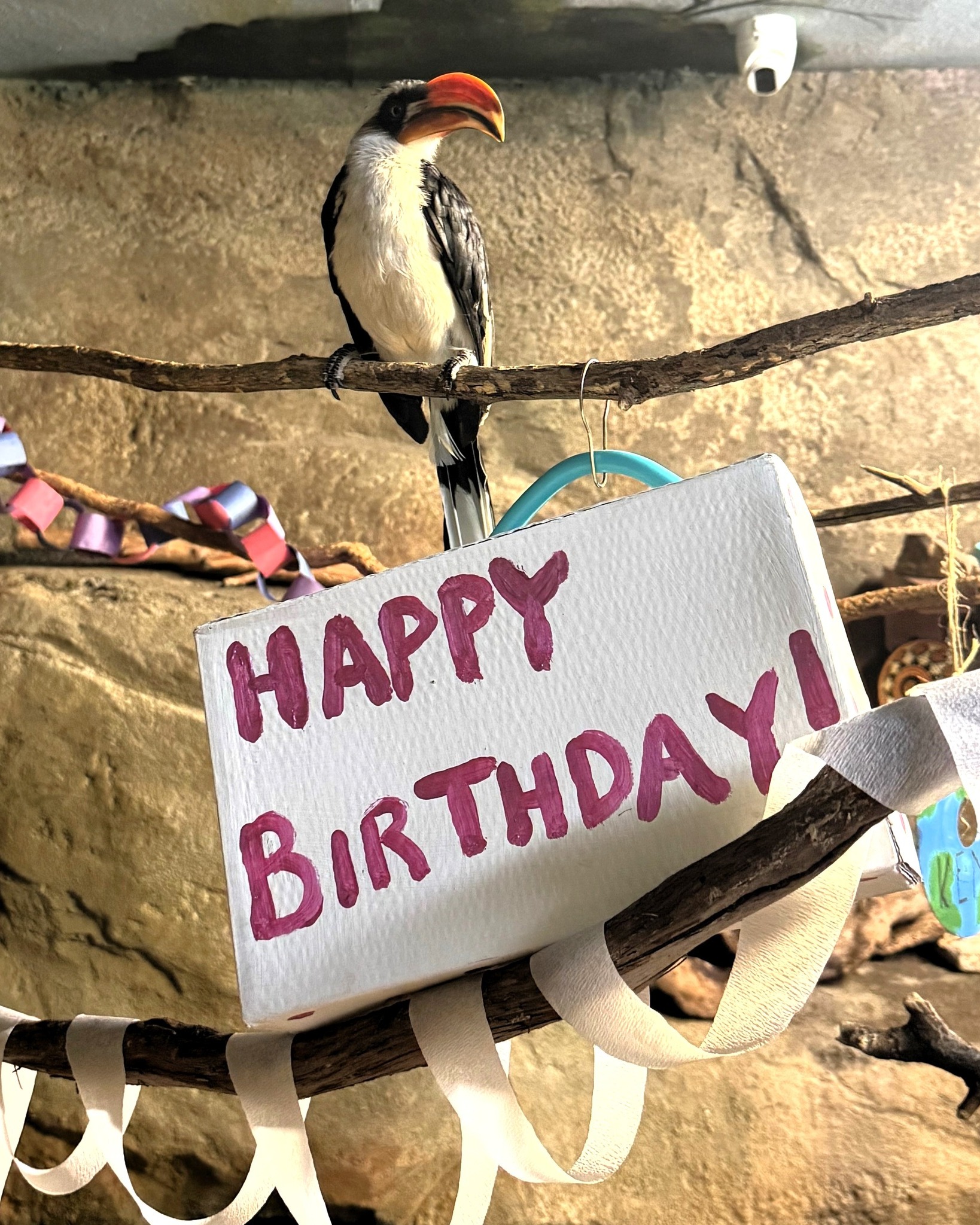- Keni’s background and his role as an ambassador species at the Boonshoft Museum of Discovery.
- Understanding the Von der Decken’s hornbill and its natural habitat.
- The dietary and enrichment needs of Keni and other hornbills.
- The importance of conservation efforts for species like the Von der Decken’s hornbill.
- The educational impact of animal ambassadors in zoo and aquarium environments.
Keni, our male Von der Decken’s hornbill, hatched on April 21, 2021, at the Bronx Zoo in New York and later arrived at the Boonshoft Museum of Discovery on December 16, 2021. Since joining our animal ambassador program, Keni has captured the hearts of numerous visitors with his playful and curious demeanor. As an ambassador species, Keni plays a pivotal role in educating the public about his species and the larger environmental issues they face.
The Von der Decken’s hornbill is native to East Africa, particularly found in the dry forests and savannahs of Kenya and Tanzania. This species displays striking physical features, most notably its stout, orange bill and the distinctive sexual dimorphism that makes males larger than females. Such differences help researchers and enthusiasts identify gender while studying these birds in their natural habitats. The hornbills contribute to their ecosystem by dispersing fruit seeds, thereby aiding forest regeneration. Yet, despite their ecological importance, they face threats from habitat destruction and hunting.
Understanding Keni’s dietary needs is vital to providing adequate care for him. In the wild, Von der Decken’s hornbills are omnivorous, feeding on a variety of fruits, insects, and small vertebrates. In captivity, Keni enjoys a diverse diet that includes super worms, juicy grapes, and other fruits like apples, pears, and cantaloupe. He also benefits from vegetables such as corn, peas, and green beans, as well as specialized bird chow. This balanced diet ensures he receives the necessary nutrients to maintain his health and vitality. Moreover, a variety of insects, including crickets, mealworms, and dubia roaches, enrich his diet and satisfy his natural foraging behaviors.
Enrichment activities are crucial for Keni’s physical and mental well-being. They involve offering diverse stimuli that encourage natural behaviors, which can include climbing, foraging, and exploring. For Keni’s birthday celebration, the animal care team provided colorful paper enrichment to stimulate his curiosity and playfulness. Ensuring these activities are part of his routine is essential, as they prevent boredom and promote overall behavioral health.
Conservation efforts for species like the Von der Decken’s hornbill are critical. As mentioned, these birds are affected by habitat loss due to logging, agricultural expansion, and urban development. Preservation of their natural environment is essential for their survival. Conservation groups actively work to protect the unique habitats of East African wildlife, developing strategies to mitigate human impacts on these ecosystems. Educational programs play a significant role in these efforts, as they empower communities to take part in conservation practices.
Keni’s role as an animal ambassador extends beyond merely being a captivating presence. He is instrumental in raising awareness about the broader issues related to wildlife conservation. Visitors to the Boonshoft Museum of Discovery engage with him, often asking questions about his species and their habitats. This interaction helps cultivate a deeper understanding and appreciation for wildlife and the importance of protecting these fascinating creatures.
Integrating animal ambassadors like Keni into educational programs enriches the learning experience for museum visitors. It allows for firsthand experiences that can have a lasting impact on conservation attitudes and behaviors. The presence of an ambassador species fosters empathy and connection between humans and wildlife, striding towards becoming responsible stewards of the environment.
By celebrating Keni’s milestones, such as his recent birthday party filled with paper enrichment and scrumptious treats, we are reminded of the joy these magnificent creatures bring into our lives. Keni’s journey from the Bronx Zoo to the Boonshoft Museum of Discovery not only highlights the importance of inter-institutional collaboration in wildlife care but also underscores the significance of maintaining and supporting animal ambassador programs. These efforts create a shared sense of responsibility in addressing environmental challenges and promoting conservation awareness.
The Von der Decken’s hornbill, like Keni, serves as an emblem of the intricate connections within ecosystems. Their roles as seed dispersers are vital in maintaining the health of forests and savannahs. However, it is essential that we do not overlook the threats they face in their native lands, effectively advocating for habitat conservation and sustainable practices.
In conclusion, Keni, our male Von der Decken’s hornbill, exemplifies the importance of wildlife education and conservation efforts. His playful personality and dietary needs underscore the complexities of caring for such a unique species, while his role as an animal ambassador promotes understanding and awareness among museum visitors. By cherishing Keni’s journey and celebrating his life, we embrace the mission of wildlife conservation and cultivate a sense of stewardship for the environment.
*****
Source Description
Today we’re celebrating Keni, our male Von der Decken’s hornbill, who hatched at the Bronx Zoo in The Bronx, New York on April 21, 2021! Keni arrived at the Boonshoft Museum of Discovery on December 16, 2021, and has been brightening our lives ever since with his curious and playful personality.
To mark his special day, the animal care team threw him a fun birthday party filled with colorful paper enrichment and all his favorite treats! Keni especially loves super worms and juicy grapes, but his diet also includes chopped fruits like apple, pear, and cantaloupe, as well as veggies like corn, peas, and green beans, along with a special bird chow and a variety of insects including crickets, mealworms, and dubia roaches.
Fun Fact: Keni is easy to spot with his orange beak and larger size compared to his sister, Lulu. While they share the same parents, they came from different clutches, making them full siblings born at different times.
We’re so lucky to have Keni as part of our animal ambassador family — here’s to many more fun birthdays to come! 🎈🐦💕
📷: Reese Miller, Animal Keeper


